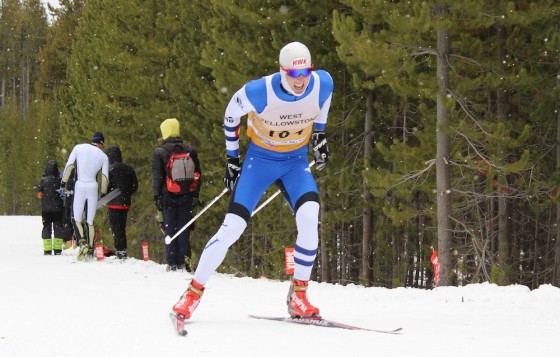
WEST YELLOWSTONE, Mont. — Friday’s distance results in the first SuperTour of the season weren’t easy for everyone to swallow, especially not Ryan Scott of Ski & Snowboard Club Vail/Team HomeGrown.
His coach Eric Pepper racked it up as a bad day. “He went out a little hard, blew up pretty hard [and] didn’t have great legs,” Pepper said on Saturday.
Still, seeing he ranked 78th in the 9-kilometer skate individual start hurt.
“That was embarrassing,” Scott said after finishing more than 2 ½ minutes behind first. Fortunately, he could seek some redemption in Saturday’s 1.6-kilometer freestyle prologue.
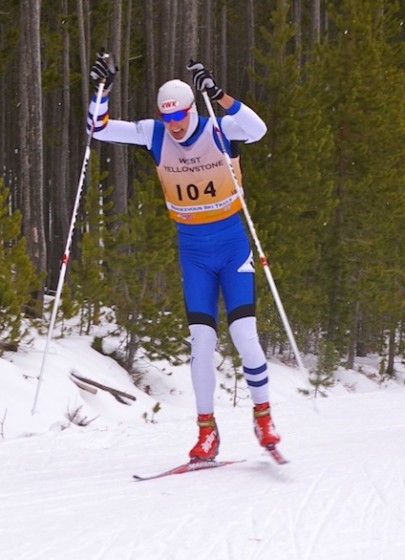
With just one shot in the point-to-point race, he could go all-out and try for a drastically better result. More than jump 70-plus places, he wanted to win.
Scott successfully took the top honor for the first time in his skiing career, clocking 3 minutes, 0.96 seconds on the South Plateau course. He beat Erik Bjornsen of the U.S. Ski Team (USST) and Alaska Pacific University by 2.33 seconds.
David Norris of Montana State University (MSU) and Mikey Sinnott (Sun Valley Ski Education Foundation) were just 0.01 seconds apart in third and fourth, respectively. Skyler Davis of the USST and Stratton Mountain School T2 Team, who was 105th on Friday, improved 100 places to finish fifth.
In the men’s prologue, second through fifth place were separated by just 0.68 seconds.
While Scott welcomed the victory, after never having won a SuperTour, International Ski Federation (FIS) or college race, it was more of a primer than anything.
Low snow at the Rendezvous Ski Trails in town forced organizers to change the sprint format earlier in the week from sprint rounds to a prologue. The snowmobile trails on the plateau couldn’t sustain full sprints: they were neither wide enough nor conducive for getting athletes from the finish back to the start multiple times.
The prologue didn’t count toward SuperTour standings and qualifying standards for the upcoming Canadian World Cups, but it was FIS-sanctioned and good practice for the Bozeman SuperTour freestyle and classic sprints as World Cup qualifiers next week.
Either way, the 23-year-old MSU graduate was excited to drastically improve on his distance performance with his first win.
“It was a solid effort,” Scott said. “I felt real quick, and yeah, it went well. I had a lot of confidence going into this course, being that it was so quick and flat, and the finish was pretty good, only a slight uphill, so I thought it could be a good day.”
It turned out to be a great day for Scott, who finished 11th in the SuperTour sprint rankings last year. The course was one he and some 175 other competitors – male and female – were familiar with. It ended where they started Friday’s race, which meant one gradual climb to the finish and mostly flat before it.
Unlike full sprints, where racers tend to conserve energy through the rounds, a prologue required a maximal effort. Pepper said he hadn’t expected Scott to win, but he didn’t rule him out, either.
“He’s better in rounds than qualifying,” Pepper said. “This shows he’s been working on qualifying, so for him to have a good day like that is great.”
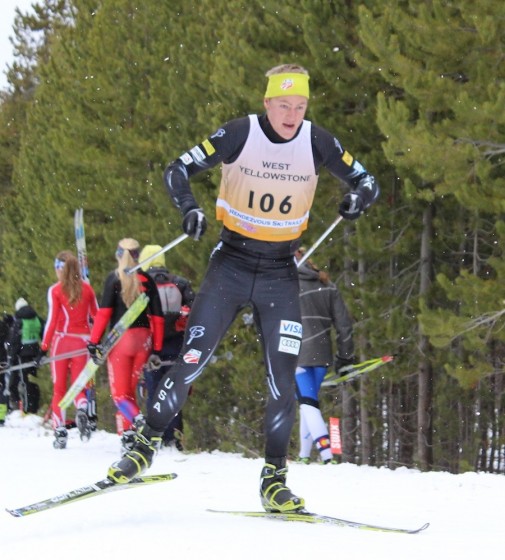
- At the same time, he was particularly impressed Scott could outdo a stacked field in which the top 20 finished within 10.21 seconds of one another.
“A win is a bonus really,” Pepper said. “It’s impressive, those first 20 or 30 guys, they’re all really good. To get on top of that group when only a couple of top guys aren’t there feels great.”
Even though Friday’s race didn’t cater to his strengths, Saturday’s result was a major boost moving forward.
“It’s fairly rewarding to be able to come out and race fast today,” Scott said. “I know I can still kick it in gear and move pretty quick so that’s kind of what I’m shooting for. I’m glad I was able to perform well enough today and we’ll see, end of next week for the rounds and whatnot, the races up in Bozeman.
“I’ve been really training for sprint this year,” he added. “I’m hungry.”
Bjornsen as the runner-up tied his best SuperTour result – even though Saturday’s race wasn’t technically a SuperTour – since placing second in last year’s 15 k classic in Bozeman.
He said last year wasn’t his best as far as sprints go (although he did place third in a NorAm classic sprint at Sovereign Lake, B.C.), so he made that a priority this year. Considering Saturday didn’t have World Cup implications, he used the prologue to try a few things.
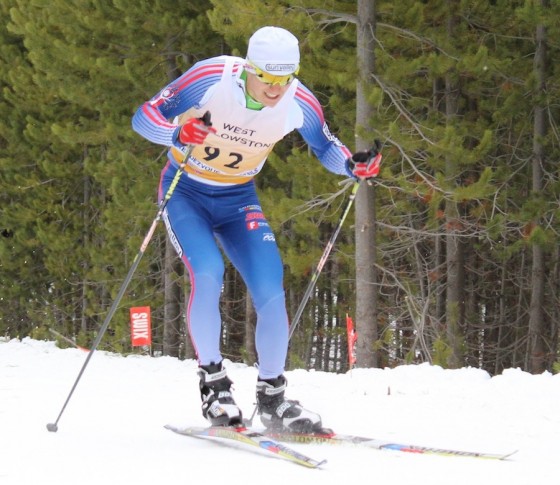
“I warmed up pretty hard and the goal was to go out hard and hammer the V2 alternate on the flats,” Bjornsen said.
After the race, he spoke with some people who said they did some tuck skating. He didn’t do any of that, he said, just tall V2-ing to make every stroke count. When he reached a road sign a few hundred meters from the finish, he focused on turning it on. With 100 meters to go, Bjornsen searched for the finishing kick he usually has, but it wasn’t there.
“I knew that I left it all out there,” he said. “I actually ended up throwing up a little bit [after], but I definitely laid it all out there which I’m happy about.”
While Bjornsen might have been pegged as a favorite, Norris was a sprint surprise finishing 2.72 seconds behind Scott.
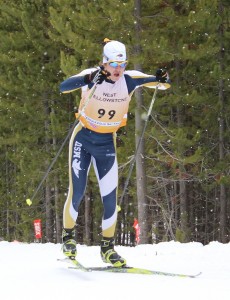
It’s not that Norris hasn’t logged impressive results; he was second in the 20 k classic at NCAA Championships in March for MSU’s first-ever podium. The 21-year-old was second in the 30 k mass start at U.S. nationals last year and third in the Bozeman SuperTour 15 k classic behind Bjornsen.
But a sprint podium?
“I always want to win, so I was just going for that,” Norris said. “I just went hard right from the start. I was trying to hang on that last hundred meters.”
He held on just enough to edge Sinnott, who was second to Sun Valley teammate Reid Pletcher in the West Yellowstone freestyle prologue last year. Preliminary results listed Davis in second, Norris in third and Bjornsen in fourth, but once timing data updated and results became official, the final standings came through.
Just 0.29 seconds off the podium, Davis felt like he had a great race. The uncharacteristic leaping and shouts from his Stratton coaches indicated he was on the right track. With 100 meters to go, Kaeding was yelling for him harder than he’d ever heard, Davis said. Earlier in the race, program director Sverre Caldwell gave him a “woo hoo!” and jumped as he passed by.
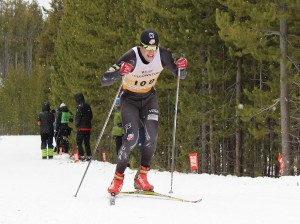
“I was like, ‘I’ve never seen that so I better keep going real fast,’ ” Davis said after the race.
While warming up, he laid out a pretty distinct game plan. Only one downhill made the course tough so he needed to build momentum fast and stay smooth. Like Bjornsen, that “little squiggly sign” was his cue to go hard.
“I put it down from there and I saw the hundred meter and it was like, ‘Wooo, [then], uh oh, it’s hurting bad, like, really bad,’ ” he recalled. That’s where Kaeding’s presence helped him.
“More than results everybody had kind of check marks they wanted to do, little process goals,” Kaeding said of his team, which included women’s prologue winner Sophie Caldwell. “Checked those all off. Everyone was happy with how those went. The results take care of themselves.”
— Audrey Mangan contributed reporting
***
Complete results (scroll down for men)
Alex Kochon
Alex Kochon (alexkochon@gmail.com) is a former FasterSkier editor and roving reporter who never really lost touch with the nordic scene. A freelance writer, editor, and outdoor-loving mom of two, she lives in northeastern New York and enjoys adventuring in the Adirondacks. She shares her passion for sports and recreation as the co-founder of "Ride On! Mountain Bike Trail Guide" and a sales and content contributor at Curated.com. When she's not skiing or chasing her kids around, Alex assists authors as a production and marketing coordinator for iPub Global Connection.



